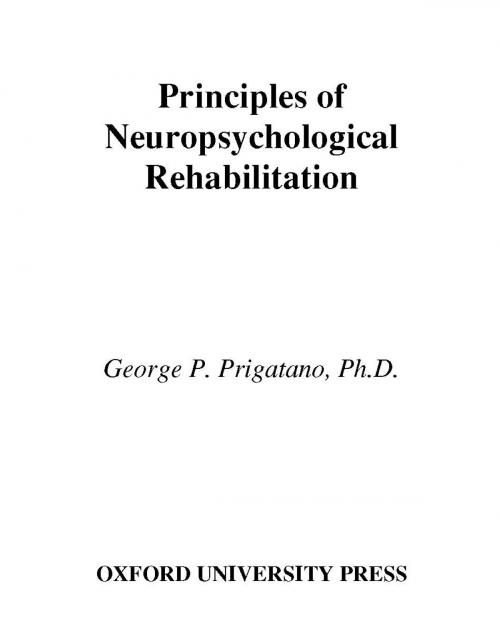Principles of Neuropsychological Rehabilitation
Nonfiction, Health & Well Being, Medical, Specialties, Internal Medicine, Neurology, Psychology, Neuropsychology| Author: | George P. Prigatano | ISBN: | 9780190282004 |
| Publisher: | Oxford University Press | Publication: | July 8, 1999 |
| Imprint: | Oxford University Press | Language: | English |
| Author: | George P. Prigatano |
| ISBN: | 9780190282004 |
| Publisher: | Oxford University Press |
| Publication: | July 8, 1999 |
| Imprint: | Oxford University Press |
| Language: | English |
Without guiding principles, clinicians can easily get lost in the maze of problems that a brain-damaged patient presents. This book underlines the importance of patients' subjective experience of brain disease or injury, and the frustration and confusion they undergo. It shows that the symptom picture is a mixture of premorbid cognitive and personal characteristics with the neuropsychological changes directly associated with brain pathology. By closely observing the patient's behavior, the clinician can teach him or her about the direct and indirect effects of brain damage. The book provides guidelines both for the remediation of higher cerebral disturbances and the management of patients interpersonal problems. It presents a new perspective on disorders of self-awareness and recovery as well as deterioration phenomena after brain injury. It will be an invaluable resource for psychologists, neurologists, and psychiatrists involved in neuropsychological rehabilitation.
Without guiding principles, clinicians can easily get lost in the maze of problems that a brain-damaged patient presents. This book underlines the importance of patients' subjective experience of brain disease or injury, and the frustration and confusion they undergo. It shows that the symptom picture is a mixture of premorbid cognitive and personal characteristics with the neuropsychological changes directly associated with brain pathology. By closely observing the patient's behavior, the clinician can teach him or her about the direct and indirect effects of brain damage. The book provides guidelines both for the remediation of higher cerebral disturbances and the management of patients interpersonal problems. It presents a new perspective on disorders of self-awareness and recovery as well as deterioration phenomena after brain injury. It will be an invaluable resource for psychologists, neurologists, and psychiatrists involved in neuropsychological rehabilitation.















